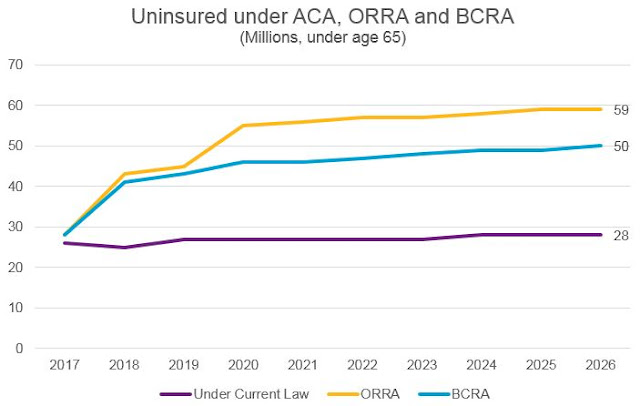| Today's Managing Health Care Costs Number is 59 million |
 |
| Sources: BRCA ORRA |
Once again, we face the irony of a Republican arising from his sickbed to jet to Washington to be available to be the single Congressional vote to wrest health care away from tens of millions of Americans. For the House vote on the American Health Care Act, Jason Chaffetz returned after ankle surgery - in the end, the R's had one extra vote and he could have avoided becoming a meme by using a scooter to get to the House vote. Today, John McCain will be back in DC after his diagnosis of glioblastoma. A maverick no longer, he is there to cast the potential fiftieth vote to begin debate on a bill that has not been released, but is likely similar to either the "Better Care Reconciliation Act" or the "Obamacare Repeal Reconciliation Act (ORRA)," either of which would cause loss of coverage for between 22 and 32 million Americans.
It's a good time to reexamine the Congressional Budget Office assessments of these two bills.
BCRA would make devastating cuts in Medicaid, decrease total funds to subsidize health insurance for those with modest incomes, and spread those subsidies over more people so there is less subsidy per beneficiary. It would lower the value of the 'benchmark' plan, so that deductibles would skyrocket. According to the CBO, it will be pretty much impossible to craft a compliant plan, as the deductibles will need to be $13,000, while the maximum out of pocket spending for many eligibles would be under $11,000. The individual mandate will be eliminated, but the Republican plan to have a 6 month lockout period for those who had a lapse in coverage was nixed by the Senate Parliamentarian, so the impact of adverse selection on the individual marketplace would likely be even greater than the CBO projects.
ORRA repeals most elements of the Affordable Care Act outright as of 3-4 years from now, figuring once the fuse has been lit Congress will pass a replacement before the cuts begin. According to the CBO, the individual market would be wiped out.
After weighing the evidence from prior state-level reforms and input from experts and market participants, CBO and JCT estimate that about half of the nation’s population lives in areas that would have no insurer participating in the nongroup market in 2020, and the share would continue to increase, extending to about three-quarters of the population by 2026. That contraction of the market would most directly affect people without access to employment-based coverage or public health insurance.
US Senators and Representatives, beneficiaries of the best of American health care, with no worries about the financial implications of their medical care, courageously leave their sickbeds to vote on legislation that will take health care away from tens of millions of their constituents.
EmoticonEmoticon